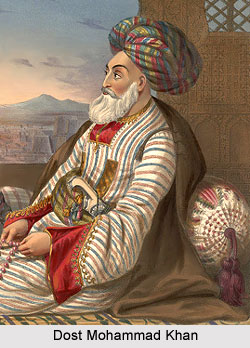 Dost Mohammad Khan was the Nawab and the founder of Bhopal in central India. He established the modern Bhopal city, which is now the capital of the state of Madhya Pradesh. Dost Mohammad Khan was an Afghan from Tirah. In 1703, he joined the Mughal imperial army at Delhi. He quickly rose through the ranks and was allocated to the Malwa region located in central India. Mohammad Khan began to provide mercenary services to various chieftains in the local regions after the death of Emperor Aurangzeb. He operated mostly in the politically uneven Malwa province. In the early 1720s, Dost Mohammad Khan developed Bhopal, which was a village at the time, into a fortified city. Moreover he attained the title of Nawab that was widely utilised by the Muslim leaders of princely states of India.
Dost Mohammad Khan was the Nawab and the founder of Bhopal in central India. He established the modern Bhopal city, which is now the capital of the state of Madhya Pradesh. Dost Mohammad Khan was an Afghan from Tirah. In 1703, he joined the Mughal imperial army at Delhi. He quickly rose through the ranks and was allocated to the Malwa region located in central India. Mohammad Khan began to provide mercenary services to various chieftains in the local regions after the death of Emperor Aurangzeb. He operated mostly in the politically uneven Malwa province. In the early 1720s, Dost Mohammad Khan developed Bhopal, which was a village at the time, into a fortified city. Moreover he attained the title of Nawab that was widely utilised by the Muslim leaders of princely states of India.
Early Life of Dost Mohammad Khan
Dost Mohammad Khan was born on 1672 in Tirah region, on the western border of the Mughal Empire. Nur Mohammad Khan, his father, belonged to the Mirazi khel clan, Orakzai tribe. He was a Pashtun nobleman. Dost Mohammad Khan was engaged to Mehraj Bibi in his early 20s, but as he was aggressive by nature, Mehraj affianced his cousin. As a result, Dost Mohammad Khan murdered his cousin and was banished from his family. Much later, Khan went to Delhi and spent almost a year in the shelter of Mullah Jamali. Eventually he decided to join the Mughal army and he was financially supported by the Mullah.
Dost Mohammad Khan in Mughal Army
Dost Mohammad Khan joined the Mughal army in 1703 and enlisted himself with Mir Fazlullah, who was the Keeper of Arms. During 1704, he was ordered to suppress a rebellion by Tardi Beg, a governor in the Bundelkhand region. Dost Mohammad led the Mughal army of Gwalior to a combat with the forces of Tardi Beg, which was led by General Kashko Khan. Later the regiment of Dost Mohammad Khan was presented to Emperor Aurangzeb by Mir Fazlullah in 1705. After Aurangzeb died in 1707, two sons of the late emperor approached him for allegiance, as a battle of succession occurred between them. But Khan refused to help either of them in order to remain loyal to his emperor.
Later Life of Dost Mohammad Khan
After Aurangzeb died, power struggles began in Malwa between several chieftains in the region, as there was a lack of central authority. Dost Mohammad Khan accumulated and led a group of 50 Pathan mercenaries and began to provide support and protection to the chieftains against plunder and conflict. In 1709, Khan took on the lease of Berasia estate, and as a mercenary served the diminutive Rajput principality of Mangalgarh. At a later period, he took the side of the local Rajput chiefs of Malwa as a revolt occurred against the Mughal Empire. He was wounded and defeated in the resulting battle and eventually helped Sayyid Hussain Ali Khan Barha, who was badly injured. Dost Mohammad Khan annexed various territories in Malwa to his state. He also provided mercenary services to the Rani Kamlapati, ruler of the Gond kingdom. As a result, he received the region of Bhopal in lieu of payment. Later he also annexed Gond kingdom.
Development of Bhopal
During the early 1720s, Dost Mohammad Khan developed Bhopal, which was originally a village and transformed it into a fortified city. The foundation of the fort was laid on 30 August 1723. Eventually he acquired the title of Nawab of Bhopal. In March 1724, Mughal nobleman Nizam-ul-Mulk invaded Bhopal and compelled Dost Mohammad to surrender most of his territory and accept the suzerainty of the Nizam. As the Nizam took control over Bhopal, Dost Mohammad Khan was appointed as the fort commander, known as kiledar.
During his final years, Dost Mohammad Khan served and was inspired from Sufi saints and mystics. He and his followers brought the Islamic and Pathan influence to the architecture and culture of Bhopal. In 1818, the state of Bhopal became a British protectorate and was ruled by the descendents of Dost Mohammad Khan till the year 1949. Later it was amalgamated with the Dominion of India.






































